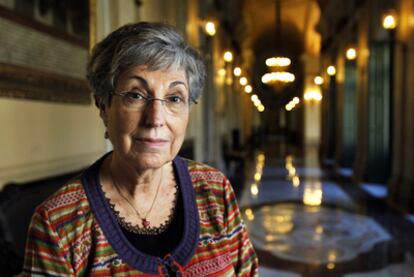The last all-male bastion gives way
The Royal Academy of Jurisprudence and Legislation admits its first female member - Women only hold 5.7 percent of total seats in related institutions
It was the last of Spain's panoply of royal academies without a woman in its ranks. But now the Royal Academy of Jurisprudence and Legislation (RAJL) has picked a female jurist to occupy one of its seats. Encarnación Roca Trías, a civil law professor and Supreme Court judge and no stranger to treading new ground, has on her second attempt penetrated the last all-male Royal Academy bastion. She aims to bring an "open vision" to an institution whose members - who hold their posts for life - have an average age of over 80.
"If you don't work, no record is worth it, and I like my work," she says. Born in Barcelona in 1944, she became Spain's first professor of Civil Law in 1978 at Barcelona University. The entrance exam for the post marked the first and only time she felt being a woman might be a drawback. "It was more difficult for me to win a place than if had been a man. I had to do it better and they made me feel very uncomfortable. My teacher told me after the exam: 'If it doesn't turn out well, it won't be a scandal, but there could be a scandal.' And there wasn't," she says.
Roca says she's "convinced of the principles of merit and ability," adding: "I don't know if it's more difficult for women to be recognized."
With the post of professor in her pocket, Roca broke the mold again in 1980 when she became the first woman to enter the Academy of Jurisprudence and Legislation in Catalonia. A quarter of a century later, she became the first female judge in the Civil Division of the Supreme Court - the fourth woman to be admitted onto that bench.
As a youngster she never thought about becoming a judge, a profession then closed to women. Now she is convinced that she will see more female than male judges in the Supreme Court before she dies.
Despite her rich résumé, Roca has had to persevere to gain admittance to the RAJL. At her first attempt several months ago, there were various candidates and the seat remained vacant for three rounds of voting. On November 21, as the only candidate, she won in the first round, allowing her defenders, Eduardo García de Enterría, Aurelio Menéndez and Ramón López Vilas, to breathe a sigh of relief.
"She was a magnificent candidate both as a civil law expert and a judge. What's more, it was scandalous that there were no women in this Academy," says López Vilas. The RAJL president, Landelino Lavilla, played down the delay in choosing the first female member - "at least in modern times" - of an entity that dates back to 1730: "It wasn't especially difficult for us. Everything has to have time to develop."
Roca's selection comes during a "phase of renovation" for the institution, says López Vilas. "The curse has now been lifted," jokes Roca, who wants to submit more female candidates.
Her election puts the 34-member RAJL on a par with the Royal Academy of Moral and Political Science - 42 members - and the Royal Academy of Medicine - 47 - both of which have only one female member each in their ranks. The Royal Academies of Exact, Physical and Natural Sciences (46 seats), History (34) and Fine Arts of San Fernando (60) all have two each. The largest number of women are in the Pharmacy (40) and the Spanish (42) Academies, which have six and five respectively. In total, of the 347 members of the eight Royal Academies under the umbrella of the Spain Institute, only 20 are women - just 5.76 percent.
Roca hasn't yet written her inaugural speech, but she has already chosen her theme: the influence of social change on family law. And when she gives it, the sessions will then start with "lady and gentlemen of the Academy," ventures López Vilas.

Tu suscripción se está usando en otro dispositivo
¿Quieres añadir otro usuario a tu suscripción?
Si continúas leyendo en este dispositivo, no se podrá leer en el otro.
FlechaTu suscripción se está usando en otro dispositivo y solo puedes acceder a EL PAÍS desde un dispositivo a la vez.
Si quieres compartir tu cuenta, cambia tu suscripción a la modalidad Premium, así podrás añadir otro usuario. Cada uno accederá con su propia cuenta de email, lo que os permitirá personalizar vuestra experiencia en EL PAÍS.
¿Tienes una suscripción de empresa? Accede aquí para contratar más cuentas.
En el caso de no saber quién está usando tu cuenta, te recomendamos cambiar tu contraseña aquí.
Si decides continuar compartiendo tu cuenta, este mensaje se mostrará en tu dispositivo y en el de la otra persona que está usando tu cuenta de forma indefinida, afectando a tu experiencia de lectura. Puedes consultar aquí los términos y condiciones de la suscripción digital.








































